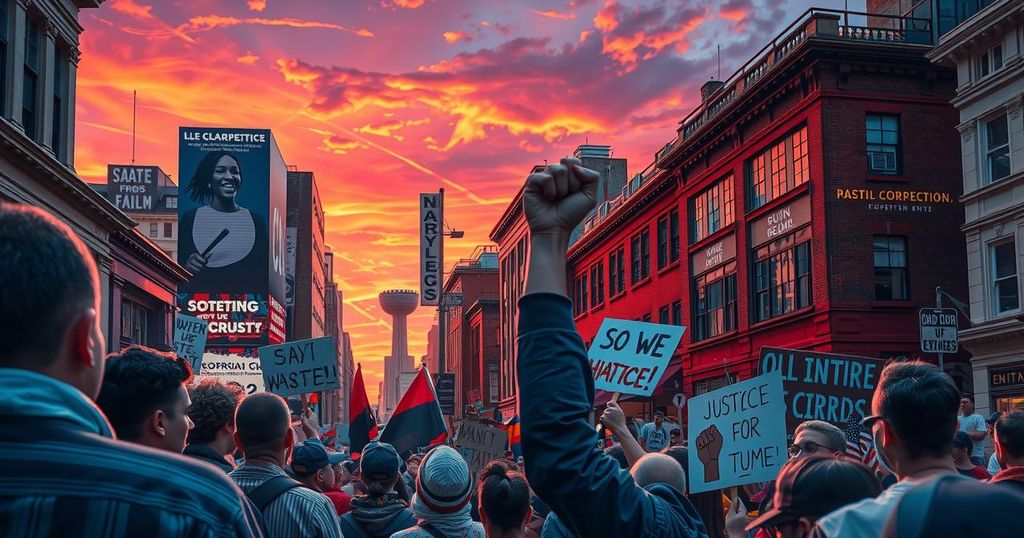Kenya Protests Erupt After Activist Albert Ojwang Dies in Police Custody

Albert Ojwang’s death in police custody has triggered widespread protests in Kenya over allegations of police brutality and corruption. Arrested for social media criticisms, he died shortly after, with his family and numerous activists questioning the official police narrative. With upcoming reforms remaining unaddressed, the protests are reigniting calls for justice and change.
The death of activist Albert Ojwang while in police custody has ignited a wave of protests across Kenya. This tragic incident, which occurred shortly after his arrest on allegations of damaging the police’s reputation on social media, has raised numerous questions. Protests have intensified as the country gears up for the one-year anniversary of ongoing demonstrations against government policies surrounding corruption and tax reforms.
Ojwang, who criticized the police via his blog and social media, died just hours after being detained. Officials from the police claim that he inflicted injuries on himself by banging his head against the wall inside his cell. However, both family members and supporters are disputing this explanation vehemently. They’re calling for a thorough investigation into the circumstances surrounding his death.
Initially, an autopsy for Ojwang was set for Monday, but it was later postponed. It’s now scheduled for Tuesday, which leaves family members, particularly his father, anxiously waiting at the morgue. Many people remain skeptical of the police narrative, especially given the reports of multiple injuries on Ojwang’s body, including severe bruising to his head, hands, and shoulders.
During a visit to the morgue, Julius Juma, the family lawyer, grilled the police claims, noting the inconsistency in why Ojwang was placed in solitary confinement if he was arrested for mere criticism. He emphasized the need for clarity regarding the true cause of Ojwang’s death and accountability for whoever is responsible.
In support of Ojwang’s family, human rights activists rallied at the morgue, demanding answers. Hussein Khalid, the director of Vocal Africa, made clear their plight, stating, “We say: ‘enough is enough.’ We have lost too many lives at the hands of the police. Whatever the circumstances, no one should die in police custody.”
In Nairobi, protests erupted near the Central Police Station where Ojwang died. Some of the demonstrators clashed with police, who resorted to using tear gas. Police officials contend that Ojwang was found unconscious in his cell and died upon arriving at the hospital. In response to the outcry, the police have suspended all officers who were on duty that night to allow for the ongoing investigation, as announced by Inspector-General Douglas Kanja.
There’s palpable distrust among the public towards the government’s handling of this situation. Khalid from Vocal Africa expressed skepticism about the integrity of the inquiry, suggesting that previous instances of violence were glossed over. He stated, “They have not told us the truth. We know there were more injuries… We want justice for Ojwang and many others who have lost their lives.”
Amnesty Kenya also raised concerns surrounding Ojwang’s arrest, calling for transparency in the forthcoming IPOA report and emphasizing that any officers found responsible for the fatality should face consequences. The atmosphere in the country is fraught, especially as this incident echoes last year’s protests where several activists were killed.
Many activists and citizens, including Ndungi Githuku from the People’s Liberation Party, voiced their frustrations regarding ongoing economic hardships despite the government’s past decisions to withdraw controversial tax hikes. “Our demands are still not met. The joblessness they had last year is tenfold. The killings are still happening,” he noted, encapsulating widespread discontent.
On social media, Ojwang’s death has continued to stir anger and renewed calls for protests. There’s a growing sentiment that the government has not learned from its past missteps. Githuku stated that it might be time for the populace to rise up again, voicing collective anger, “It’s better to shout and die than to keep quiet and be taken from our homes.”
As the situation unfolds, many Kenyans remain on edge, turning their outrage into calls for accountability and justice. Expect further protests leading up to the anniversary as the community seeks to make their voices heard against government injustices.
The death of activist Albert Ojwang has sparked outrage and protests in Kenya amidst growing concerns about police violence and government accountability. As communities mobilize and demand justice for Ojwang and other victims, the tension is palpable. With distrust in law enforcement growing, many activists insist that the government must take concrete action to address and rectify these ongoing issues, especially as another anniversary of protests approaches.
Original Source: www.rfi.fr







